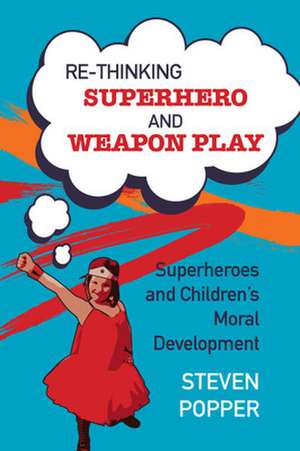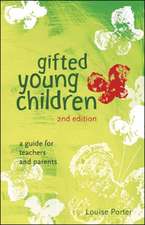Rethinking Superhero and Weapon Play
Autor Steven Popperen Limba Engleză Paperback – 16 mar 2013
- A detailed look at why many early years professionals and teachers are cautious about superhero and weapon play. Does weapon play make children more violent? Do ‘goodies versus baddies’ stories make children more confrontational? Do superheroes offer positive gender role-models? The book tackles these questions and suggests some alternative perspectives, as well as offering practical advice about keeping children’s superhero and weapon play positive and productive.
- An exploration of how superhero and weapon play relates to the development of children’s moral values, moral principles and moral reasoning; the building of children’s co-operation, empathy and sense of community; and the development of children’s sense of self and self-esteem.
- Discussion of the deep moral themes that lie within superhero narratives, and how superhero characters and narratives can be used to enhance and deepen children’s understanding of good character, moral responsibility, attachment, prejudice and ill-treatment, and why it is important to be good in the first place.
- A wealth of learning opportunities and suggestions of ways to use superheroes to advance children’s moral, philosophical and emotional thinking
Dr. Sheena Calvert, Senior Lecturer, University of Westminster, UK
“This book authoritatively assesses the virtues of engaging in superhero play with young children. It argues that far from damaging children and encouraging them to adopt unthinking, aggressive behaviours superhero play is an implicitly moral activity. It encourages children to explore profound moral and ethical thinking. This book is both a well-researched account of the appeal that superhero play has for children of both sexes and a practical guide to how such play can be used imaginatively in early years settings.”
Rob Abbott, Senior Lecturer in Early Childhood and Education, University of Chichester, UK
Preț: 237.48 lei
Nou
Puncte Express: 356
Preț estimativ în valută:
45.44€ • 47.57$ • 37.60£
45.44€ • 47.57$ • 37.60£
Carte tipărită la comandă
Livrare economică 07-21 aprilie
Preluare comenzi: 021 569.72.76
Specificații
ISBN-13: 9780335247066
ISBN-10: 0335247067
Pagini: 184
Ilustrații: black & white illustrations
Dimensiuni: 152 x 229 x 10 mm
Greutate: 0.28 kg
Editura: McGraw Hill Education
Colecția Open University Press
Locul publicării:United Kingdom
ISBN-10: 0335247067
Pagini: 184
Ilustrații: black & white illustrations
Dimensiuni: 152 x 229 x 10 mm
Greutate: 0.28 kg
Editura: McGraw Hill Education
Colecția Open University Press
Locul publicării:United Kingdom
Cuprins
Preface
AcknolwedgementsIntroduction
Part One: Arguments held against war, weapon and superhero play - and some responses
The argument that war and weapon play almost automatically leads to increased aggression and violence
The argument that superheroes equate to the normalization or glorification of violence
The argument that superheroes offer up negative, stereotypical and destructive role-models of masculinity and femininity
Part Two: Rethinking superhero and conflict play
Theoretical understandings of children’s moral development
From ‘rough-and-tumble’ play to superhero and conflict play
Superhero and conflict play and the development of co-operation, empathy and sense of community
Superhero and conflict play and children’s sense of self and self-worth
The moral themes that lie behind superhero and conflict play
Part Three: Exploring superhero narratives
Superman: the god-like being
Batman: darkness within the Dark Knight
The X-Men: The rejected group
Conclusion: The merit of superheroes and superhero play
References
Index
AcknolwedgementsIntroduction
Part One: Arguments held against war, weapon and superhero play - and some responses
The argument that war and weapon play almost automatically leads to increased aggression and violence
The argument that superheroes equate to the normalization or glorification of violence
The argument that superheroes offer up negative, stereotypical and destructive role-models of masculinity and femininity
Part Two: Rethinking superhero and conflict play
Theoretical understandings of children’s moral development
From ‘rough-and-tumble’ play to superhero and conflict play
Superhero and conflict play and the development of co-operation, empathy and sense of community
Superhero and conflict play and children’s sense of self and self-worth
The moral themes that lie behind superhero and conflict play
Part Three: Exploring superhero narratives
Superman: the god-like being
Batman: darkness within the Dark Knight
The X-Men: The rejected group
Conclusion: The merit of superheroes and superhero play
References
Index







